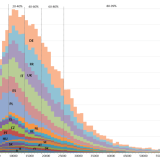EU context
O Pilar Europeu dos Direitos Sociais estabelece os compromissos da UE em matéria de salários: o direito dos trabalhadores a um salário justo que lhes garanta um nível de vida decente, a garantia de um salário mínimo adequado e a prevenção da pobreza no trabalho.
Trabalho da Eurofound
A Eurofound apresenta regularmente relatórios sobre diversos aspetos das remunerações e dos rendimentos à luz das circunstâncias económicas em mudança na Europa.
Acompanhamento das remunerações
Através do seu Observatório Europeu da Vida Profissional (EurWORK), a Eurofound reúne uma vasta gama de informações sobre remunerações. A natureza regular dos relatórios dá origem a uma grande quantidade de observações sobre remunerações acordadas coletivamente, permitindo o acompanhamento das tendências. A Eurofound publica de forma regular atualizações temáticas relativas a salários mínimos nacionais e a remunerações acordadas coletivamente. Acompanha igualmente os progressos a nível nacional relacionados com mecanismos de fixação de salários, remuneração equitativa, remuneração variável, salários baixos e disparidades de género no que respeita à remuneração.
Os perfis relativos à vida profissional por país contêm informação sobre remuneração a nível nacional e são regularmente atualizados. O EurWORK mantém duas bases de dados no domínio da remuneração (ver recursos, adiante).
O Observatório Europeu do Emprego (EJM) da Eurofound analisa as mudanças de emprego por atividade profissional, em função de diversas medidas qualitativas, incluindo a remuneração. Contribui, em particular, para o nosso conhecimento sobre o fenómeno da polarização do emprego - ou seja, em que medida o crescimento do emprego tende a ser maior no topo e na base da distribuição salarial comparativamente ao meio da mesma.
Dados do inquérito
Os inquéritos da Eurofound acompanham também as condições de remuneração na UE. A remuneração é um elemento fundamental da investigação da Eurofound para a avaliação da qualidade do trabalho. No Inquérito Europeu sobre as Condições de Trabalho (EWCS), a remuneração é um dos sete indicadores da qualidade do emprego. O EWCS elabora ainda relatórios sobre as disparidades de género no que respeita à remuneração. Explore a Ferramenta interativa de visualização de dados do EWCS
O Inquérito Europeu sobre a Qualidade de Vida (EQLS) acompanha o impacto do rendimento sobre os padrões de vida e avalia a relação entre a desigualdade de rendimentos e a coesão social e o bem-estar. Analisa a forma como a crise tem afetado as famílias, considerando as famílias de baixo rendimento, o endividamento das famílias e os grupos em risco de pobreza. O EQLS reúne ainda informação sobre os rendimentos na reforma e as opções de prolongamento da vida profissional. Explore a Ferramenta interativa de visualização de dados do EQLS.
O Inquérito Europeu às Empresas (ECS) abrange a utilização de regimes variáveis de remuneração nos estabelecimentos, bem como a cobertura dos trabalhadores desses estabelecimentos por acordos salariais coletivos. O inquérito permite relacionar a informação sobre remuneração variável e negociação salarial com informação sobre organização do trabalho, gestão de recursos humanos, participação direta dos trabalhadores e diálogo social, bem como sobre o desempenho e o bem-estar no local de trabalho.





































